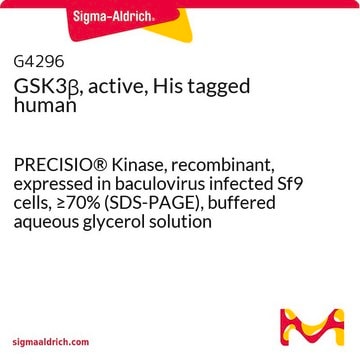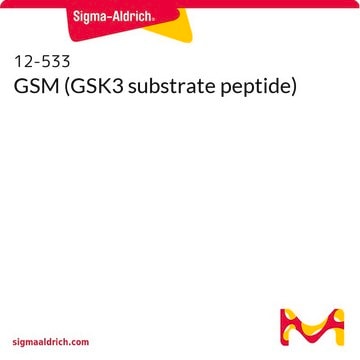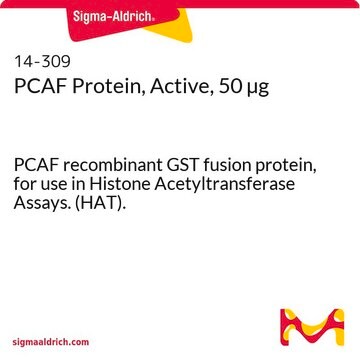14-306-M
GSK3β Protein, active, 10 µg
Active, N-terminal His6-tagged recombinant human GSK3β with an H350L mutation, for use in Kinase Assays.
Sign Into View Organizational & Contract Pricing
All Photos(1)
About This Item
UNSPSC Code:
12352202
eCl@ss:
32160405
NACRES:
NA.26
Recommended Products
biological source
human
Quality Level
recombinant
expressed in baculovirus infected Sf21 cells
form
liquid
mol wt
Mw 51 kDa
composition
mercaptoethanol, 0.1-1%
saccharose, 5-10%
manufacturer/tradename
Upstate®
storage condition
(Tightly closed)
technique(s)
activity assay: suitable (kinase)
solubility
water: soluble
NCBI accession no.
UniProt accession no.
Gene Information
human ... GSK3B(2932)
General description
Glycogen synthase kinase 3β (GSK3β) is a serine-threonine kinase that is present in most eukaryotes. The GSK3β gene is located on the human chromosome at 3q13.3. GSK3β is made up of an N-terminal β-sheet domain that is coupled to the C-terminal α-helical domain.
Research area: Cell Signaling
Research area: Cell Signaling
Biochem/physiol Actions
Glycogen synthase kinase 3β (GSK3β) regulates glycogen metabolism via an insulin-dependent pathway. It participates in many signaling pathways including cellular processes such as cell cycle, cell proliferation, and inflammation. GSK3β mediated-negative regulation of insulin signaling pathway leads to type 2 diabetes. GSK3β functions as a tumor suppressor that represses neoplastic transformation in cells. It is an essential regulator of the Wnt/β-catenin signaling pathway. Abnormal regulation of GSK3β is associated with cardiovascular disease, bipolar disorder, and neurodegenerative diseases.
Packaging
Also available in 250μg size (2x125μg)--call for pricing and availability and reference catalog number 14-306M when ordering the 250μg size.
Quality
Routinely evaluated by phosphorylation of Phospho-Glycogen Synthase Peptide-2
Other Notes
For Specific Activity data, refer to the Certificate of Analysis for individual lots of this enzyme.
Legal Information
UPSTATE is a registered trademark of Merck KGaA, Darmstadt, Germany
antibody
Product No.
Description
Pricing
inhibitor
Product No.
Description
Pricing
related product
Product No.
Description
Pricing
Signal Word
Warning
Hazard Statements
Precautionary Statements
Hazard Classifications
Skin Sens. 1
Storage Class Code
12 - Non Combustible Liquids
WGK
WGK 2
Flash Point(F)
Not applicable
Flash Point(C)
Not applicable
Certificates of Analysis (COA)
Search for Certificates of Analysis (COA) by entering the products Lot/Batch Number. Lot and Batch Numbers can be found on a product’s label following the words ‘Lot’ or ‘Batch’.
Already Own This Product?
Find documentation for the products that you have recently purchased in the Document Library.
The alpha-isoform of glycogen synthase kinase-3 from rabbit skeletal muscle is inactivated by p70 S6 kinase or MAP kinase-activated protein kinase-1 in vitro.
Sutherland, C and Cohen, P
Febs Letters, 338, 37-42 (1994)
S Phukan et al.
British journal of pharmacology, 160(1), 1-19 (2010-03-25)
Glycogen synthase kinase-3 beta (GSK3beta) is a multifunctional serine/threonine kinase which was originally identified as a regulator of glycogen metabolism. It plays a key role in the regulation of numerous signalling pathways including cellular process such as cell cycle, inflammation
rystal structure of glycogen synthase kinase 3 beta: structural basis for phosphate-primed substrate specificity and autoinhibition
Dajani R, et al.
Cell, 105(6), 721-732 (2009)
Jia Luo
Cancer letters, 273(2), 194-200 (2008-07-09)
Glycogen synthase kinase 3beta (GSK3beta), a multifunctional serine/threonine kinase found in all eukaryotes, had been initially identified as a key regulator of insulin-dependent glycogen synthesis. It is now known that GSK3beta functions in diverse cellular processes including proliferation, differentiation, motility
Mark S Wainwright et al.
Proceedings of the National Academy of Sciences of the United States of America, 100(10), 6233-6238 (2003-05-06)
Acute lung injury (ALI) associated with sepsis and iatrogenic ventilator-induced lung injury resulting from mechanical ventilation are major medical problems with an unmet need for small molecule therapeutics. Prevailing hypotheses identify endothelial cell (EC) layer dysfunction as a cardinal event
Our team of scientists has experience in all areas of research including Life Science, Material Science, Chemical Synthesis, Chromatography, Analytical and many others.
Contact Technical Service







